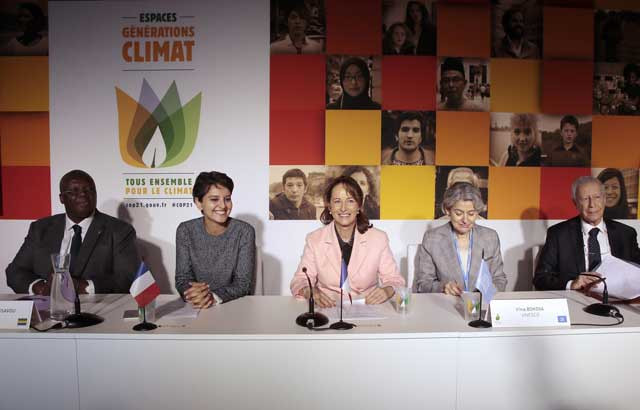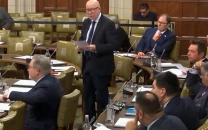Want climate action? Give us cash, India tells rich nations
India is the world's third biggest emitter of greenhouse gases, seen as a potential blocker in the Paris negotiations

(LtoR) Florentin Mossavou of Gabon, French Ecology Minister Segolene Royal, and French Education minister Najat Vallaud-Belkacem attend a meeting on actions of the banking sector for climate on December 4, 2015 in Le Bourget, near Paris, as part of the COP21 climate summit. PHOTO: AFP
Developing countries are hamstrung by a poverty-reduction imperative mixed with the expense of energy from renewable sources like wind and water, Indian official Ajay Mathur told AFP at a UN climate summit in Paris.
He touched upon one of the issues most likely to sink the decades-old talks for a pact to stave off calamitous climate change: how to share responsibility between rich and poorer nations for braking greenhouse gas emissions.
Paris climate conference: Preparation of INDCs difficult, tricky process, says Ambassador Lacoste
"If we were to accelerate it (renewable energy) for climate change reasons, then the countries which put the largest amount of carbon dioxide up in the atmosphere... the higher cost of energy has to be met by them," said Mathur.
"It is because of the presence of that large amount of carbon dioxide up in the atmosphere that we are being told there is no longer a space for more coal use in India."
India is the world's third biggest emitter of greenhouse gases. It is widely seen as a potential blocker in the Paris negotiations, which cannot produce the hoped-for agreement if there is opposition from any major party.
Some delegates are concerned India's determined stance on contentious money issues could lead to a weaker agreement.
India pledged in the lead up to Paris to cut carbon intensity -- the amount of pollution per dollar of GDP -- by up to 35 percent by 2030.
But unlike the world's top two emitters, the United States and China, it balks at net carbon reduction and plans to double coal production by 2020.
Nawaz, Modi shake hands during climate summit in Paris
"Developing countries face a huge amount of development challenges. You need money for education, you need money for health, you need money for roads, so again there are tradeoffs," said Mathur, a senior official in India's state-run Bureau of Energy Efficiency and climate negotiator.
"We don't want to lock people into perpetual energy poverty and income poverty... People have to lead a worthwhile life on a worthwhile planet."
Mathur emphasised the emissions produced by an average Indian was "almost nothing" compared to a person in a rich nation.
"Even in 2030... each Indian would be producing emissions that are less than those from any developed country," he said.
India gets about six percent of its energy from renewables today.
The only way to expand it is to make renewable energy cheaper than that derived from coal, said Mathur.
Solar and wind plant developers in India face high interest rates, he said, translating into more expensive electricity.
"So the availability of capital, for example, to bring down the interest rate would be a very useful tool in accelerating our renewable energy programme," Mathur said.
Rich nations pledged in 2009 to muster $100 billion (92 billion euros) per year from 2020 to help developing countries shift away from fossil fuels and shore up their defences against climate change-induced harms.
Developing nations have expressed anger in Paris that architecture has yet to be put in place to guarantee those funds.
Developing nations also want assurances that the amount will increase over time, but rich countries are loath to make new, long-term commitments.
In a blog post on Friday, Greenpeace chief Kumi Naidoo said India could play a major role in shaping an ambitious Paris agreement, in keeping with its desire to raise people out of poverty.
"If India moves, in the process forcing richer countries to move too, then it will not just be campaigners like me who will be grateful to you, but billions of people not yet born," Naidoo wrote.



















COMMENTS
Comments are moderated and generally will be posted if they are on-topic and not abusive.
For more information, please see our Comments FAQ